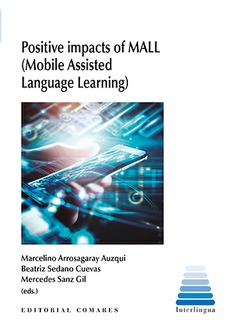POSITIVE IMPACTS OF MALL (MOBILE ASSISTED LANGUAGE LEARNING)
Marcelino Arrosagaray Auzqui (Editor) , Beatriz Sedano Cuevas (Editora) , Mercedes Sanz Gil (Editora)
Mobile technologies enable ubiquitous language learning that complements traditional formal teaching environments. Their availability and functionality have promoted self-directed informal learning that helps optimise the time students are exposed to a foreign language.
The recent COVID-19 pandemic caused an abrupt shift from traditional in-person teaching environments to distance learning emergency scenarios. All key stakeholders in language programs (administrators, teachers, and students) were caught off guard and had to scramble to find resources and solutions. At the same time, this situation created opportunities for innovation and transformation in language learning and teaching that could remain and be prolonged once critically reviewed. Within this framework, this volume aims to present different learning environments supported by mobile technology, which could become new opportunities to engage in language learning. This mediating role of mobile technology could help move from isolated personal learning to new learning scenarios whose effectiveness is worth analyzing.
This volume aims to reflect on the current challenges in mobile-assisted language learning (MALL), the multidimensional character of technological mediation, the sociocultural impact of MALL, teacher perceptions of the implementation of MALL practices and pedagogical implications derived from them. This reflection is carried out, on the one hand, through the theoretical analysis of the research that has been carried out on technology-enhanced language learning (TELL) in general and, specifically, MALL, to identify the elements, advantages and disadvantages that contribute to their effectiveness.
On the other hand, it is complemented with practice through several experimental investigations in MALL that delve into the different application scenarios (telecollaboration, hybrid learning, online, etc.), diverse methodologies and strategies (collaborative learning, task-focused, gamification, virtual reality, etc.), some specific technologies like Duolingo or Whatsapp, as well as some crucial aspects in learning such as motivation, student commitment and learning self-regulation considering their environment: migration, minority communities or rural areas.
- Editor
- Marcelino Arrosagaray Auzqui
- Editora
- Beatriz Sedano Cuevas
- Editora
- Mercedes Sanz Gil
- Colección
- Interlingua
- Número en la colección
- 358
- Materia
- Traducción
- Idioma
- English
- EAN
- 9788413696942
- ISBN
- 978-84-1369-694-2
- Depósito legal
- Gr. 1872/2023
- Páginas
- 136
- Ancho
- 17 cm
- Alto
- 24 cm
- Edición
- 1
- Fecha publicación
- 03-01-2024





